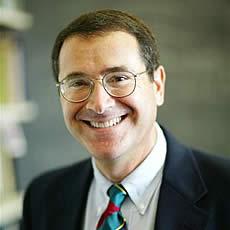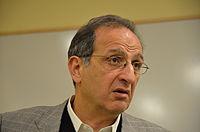Donald Trump: The First TV Character to Win a Presidential Primary
If you are angry about Donald Trump's position as the leader of the Republican presidential race and winner of the New Hampshire primary, just remember this: It's all Stephen Colbert's fault. Well, Colbert and the takeover of the Republican party by its extreme right flank.
It's not really Colbert's fault, of course, but I do believe that like Colbert on his old Comedy Central program, Trump is playing a character who shares his name.
Which is something that we should take into account when evaluating what is going on with Trump's campaign for the presidency. On Vox.com, Ezra Klein argues:
Trump is the most dangerous major candidate for president in memory. He pairs terrible ideas with an alarming temperament; he's a racist, a sexist, and a demagogue, but he's also a narcissist, a bully, and a dilettante. He lies so constantly and so fluently that it's hard to know if he even realizes he's lying. He delights in schoolyard taunts and luxuriates in backlash.
It's hard to argue with Klein if you are not a Trump supporter. At the same time, though, who is the "he" in Klein's description? Is it Trump the man or Trump the character?
Yes, I am arguing in this piece that the Donald Trump, who has been running for president since July, is a fictional character, and we really don't know what the real Donald Trump would do if he was elected president.
To make my argument, let's take a step back and look at Trump's career in the spotlight. Trump was never a stranger to publicity seeking and self-advertisement. He always struck a confident -- many would say arrogant -- pose. But as his business evolved, so did his public persona. He went from being a real estate magnate to someone in the business of licensing his name and brand. At the same time, he went from being primarily a real estate developer to primarily an entertainer.
As entertainment became his primary business, Trump started playing a character named Donald Trump, a bombastic real estate mogul who is a walking symbol of opulence and a modern, garish appropriation of the notion of class. He bellowed, "You're fired!" week after week on a network reality show, like a 21st century version of the Fonz's, "Ayyyyy!" or Urkel's, "Did I do that?" I mean, he has literally played the Trump character in the epitome of false-reality entertainment: the WWE.
Trump wasn't always as unhinged as his current character. For example, look at Trump's 1988 appearance on "Oprah," in which he has praise for George H.W. Bush, Michael Dukakis and Jesse Jackson (yes, Jesse Jackson) as presidential candidates. In the clip, Trump is confident -- even arrogant to some eyes, I'm sure -- and emits the familiar air that he thinks he knows better than anyone else. But his voice is quieter, and he speaks with more restraint.
Similarly, promoting his book The Art of the Deal on David Letterman's show in 1987, Trump downplayed his net worth and the amount of money he earned from his casino and real estate investments, preferring to talk about how great his properties are. Letterman hammered away at Trump trying to get him to talk about how much he's worth, but Trump refused to give in. Again, the confidence -- or arrogance -- is there, but, also again, Trump's voice is restrained, and he is not quick to brag. When Letterman asks him if he is a driven person, Trump responds:
I don't think of myself as driven ... I would say I am somebody that enjoys what I do, and I enjoy it so much that, perhaps, I do it well.
Perhaps!
Trump later tells Letterman:
I don't look at failures as failures. I think a failure is something that you really want to learn by.
The word loser was never uttered. If the 2016 Donald Trump character watched this clip, I bet he'd scream "loser" at the guy on the screen talking to Letterman.
Watching those late-1980s clips is eye-opening. Trump was a divisive personality even back then, but he was more human. I don't pretend to know what Donald Trump really believes. I am not convinced, though, that any of Trump's positions in the 2016 campaign are, necessarily, what he believes. Colbert (the real one this time) showed in a clever Trump v. Trump debate bit how often Trump has contradicted himself.
It seems clear to me that beginning with his birther attacks on Obama in 2011, Trump decided to create an extension of his entertainment character that would be geared toward running for president, using the rightward tilt of the Republican party as his vehicle. The character would be the raging id of the Republican party.
After all, doesn't "Make America Great Again" seem as on the nose and oversimplified as one of Colbert's declarations on the Colbert Report?
In the way that Colbert created the character of Colbert, a thinly veiled parody of Bill O'Reilly, Trump created the character of Trump, who is, as the Huffington Post puts it in an editor's note at the base of its stories about Trump:
A serial liar, rampant xenophobe, racist, misogynist, birther and bully who has repeatedly pledged to ban all Muslims -- 1.6 billion members of an entire religion -- from entering the U.S.
It's like Trump watched the Republican fringe get more and more doctrinal and unhinged and said to himself, "If I go nuts and pretend to be one of them, I'll get endless press coverage, and these idiots will vote for me. The crazier the stuff I say, the more I'll be beloved." Or maybe it's more like he thought he would retain support even if he shot someone on Fifth Avenue.
Donald Trump is punking us. Every last one of us. He is extremely skilled at manipulating the news media, and he clearly has an eye and ear for what has become of the Republican party. Now he is pretending to be a crazy person AND winning the Republican presidential nomination in the process.
Colbert played the character Colbert to be funny and to comment on the ridiculousness of right-wing pundits like O'Reilly. Why is Trump playing the character of Trump? Is he secretly the business-friendly but socially liberal real estate developer with a xenophobic streak he appeared to be in the 1980s and 1990s? Or has he become a power-hungry proto-fascist looking to turn the United States into 1930s Germany? Or is he looking to parlay his character's run for the presidency into the biggest reality television show of all time, the first one based in the White House and following the first family? Sadly, don't all three of those seem equally plausible?
Ezra Klein is right to point out how dangerous Trump is as a presidential candidate. That says a lot about where we are as a country in multiple ways. But, of course, odious people finding success in politics is not really a new story. Just look at Wisconsin, Maine or the guy who beat Trump in Iowa, just to name a few.
To me, what is truly scary about Trump's success is that, somehow, a big chunk of our country wants to elect as president a fictional character, with its creator using the campaign as a giant piece of entertainment. That may be the most American thing ever.
Colbert's transition from character to real person hosting Letterman's old "Late Show" has been a little rocky. What would Donald Trump's transition be like from character candidate to real person president? Or would he even make that transition? Maybe we would have the first television character president. Take that, Jed Bartlet!
Let's hope we never have to find out what a President Trump -- person or character -- would be like.
First posted on the Huffington Post.
To follow Mitchell Bard on Twitter, please click here.
TO FOLLOW WHAT'S NEW ON FACTS & ARTS, PLEASE CLICK HERE!
















